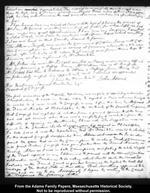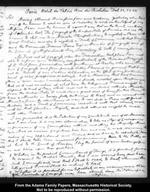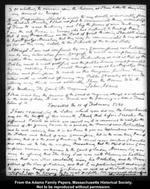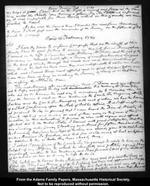We lodged at Cou Cou, and in the Night it rained and froze at the same time, untill the Roads were become a glare Ice. The Postillions informed Us, it was impossible for their Horses, which in this Country are never frosted, to travel.
As this was the second time I travelled this road from Bourdeaux to Paris I shall pass over the remainder of the Journey. On the fifteenth of Feb. I wrote to Congress
Paris 15. February 1780
Sir
I have the honor to inform Congress, that on the ninth of this Month, I had the good fortune to arrive in this City from Ferrol, where I arrived on the Eighth of December with Mr. Dana, Mr. Thaxter and the rest of the Company in tollerable health, after a journey of near four hundred Leagues in the dead of Winter, through bad roads and worse Accommodations of every kind. We lost no time more than was indispensable to restore our health, which was several times much affected and in great danger: yet We were more than twice as long in making the journey by Land, as We had been in crossing the Atlantic Ocean.
The next Morning after our Arrival in Paris, Mr. Dana and my self went out to Passy and spent the day with Dr. Franklin His Excellency Dr. Franklin, who did Us the honour the next day to accompany Us to Versailles, where We had the honour to wait on their Excellencies the Comte De Vergennes, Mr. De Sartine and the Comte De Maurepas, with each of whom We had the honour of a short Conference, upon the State of Public Affairs. It is sufficient for me at present to say in general, that I never heard the French Ministry so frank, explicit and decided, as each of these were, in the Course of this Conversation, in their declarations to pursue the War with vigour and afford effectual Aid to the United States. I learned with great Satisfaction, that they are sending under Convoy Cloathing and Arms for fifteen thousand Men to America: that seventeen Ships of the Line are already gone to the West Indies under Monsieur De Guichen, and that five or six more at least are to follow in Addition to ten or twelve they have already there.
I asked Permission of the Comte De Vergennes to write to him, on the Subject of my Mission, to which he chearfully and politely agreed. I have accordingly written to his Excellency and shall forward Copies of my Letter and of his Answer as soon as it may be safe to do so.
The English are to borrow twelve Millions this Year, and it is said the Loan is filled up. They have thrown a Sop to Ireland, but have not appeased her Rage. They give out exactly such Threats, as they did last Year, and every other Year, of terrible Preparations: but Congress knows perfectly well how those Menaces
Page 2
have been
executed accomplished. They will not be more fully executed next year than the last; and if France and Spain should throw more of their Force, expecially by Sea, into America the next Year, America will have no essential Injury to fear.
I have learned, since my Arrival at Paris, with the highest pleasure, the Arrival of Mr. Jay, Mr. Gerard and Mr. Carmichael at Cadiz, for whose Safety We had been under very great Apprehensions. I have now very sanguine hopes that a solid Treaty will soon be concluded with Spain; hopes which every Thing I saw and heard in that Country seemed to favour.
The Allyance Frigate, now under the Command of Captain Jones, with Captain Cunningham on board, is arrived at Corunna, where She is to be careened; after which She is to return to L'orient, and from thence to go to America, as I am informed by Dr. Franklin.
Mr. Arthur Lee and Mr. Izzard are still in Paris, under many difficulties in procuring a Passage home. Mr. William Lee is at Brussells. Mr. Izzard has been to Holland to obtain a Passage from thence, but unfortunately missed his Opportunity and returned disappointed.
I have the Honor to be &c.
John Adams.
His Excellency Samuel Huntington Esqr. President of Congress.
The first insinuation of the Propriety, Expediency, and necessity of appointing a Minister Plenipotentiary to reside in Europe, ready to negotiate a Peace whenever he might be invited to it, was made to Congress, a year before this time by Mr. Gerard the French Minister at Philadelphia by the Authority of the Count De Vergennes. But Congress had neglected it, whether from a general Opinion that the time had not yet arrived when there was a necessity for it, or whether from the difficulty of agreeing on the Minister, I know not. The Suggestion was renewed by the Chevalier De La Luzerne, upon his Arrival in Philadelphia. In both Cases it was the Expectation of the French Ministry that Dr. Franklin would be elected. In this respect Congress disappointed them. Alone as I was in the In another point too, Com that is in the Commission to make a Treaty of Commerce with Great Britain Congress had gone farther than the French Ministry intended. Alone as I was in both Commissions, and feeling the whole Weight of the Trust reposed in me, I determined to proceed with the utmost Caution, deliberation and Prudence; to do nothing which should excite the smallest jealousy in the French Court, or give our Ennemies the English the least Advantage of The United States or their Allies. But something appeared to be incumbent on me to do. Accordingly I began by writing to the Count De Vergennes the following Letter.
Page 3
Paris, Hotel de Valois, Rue de Richlieu Feb. 12. 1780
Sir
Having obtained Permission from your Excellency, Yesterday when I did myself the honour to wait on you at Versailles, to write on the Subject of my Mission, I have now the honour to acquaint you, that on the twenty ninth day of September last, The Congress of the United States of America did me the honour to elect me their Minister Plenipotentiary, to negotiate a Peace with Great Britain, and also to negotiate a Treaty of Commerce with that Kingdom, and the Honourable Francis Dana Esqr. a Member of Congress, and of the Council of Massachusetts Bay, Secretary to both Commissions.
As I was not at Congress, when this Transaction took place, I am not able to inform your Excellency, very particularly of the Rise and Progress of it. But from Conversation with Gentlemen at Boston, who were Members of Congress and from private Letters I learned in general, that it was not the Result of any sudden deliberation, or the Effect of any particular Event of War, prosperous or adverse: but a Measure that had been more than a Year under consideration, and finally adopted, upon this principle, that as it was uncertain at what time the belligerent Powers might be disposed to treat of Peace, which could not be concluded, without a Minister from the United States, it would save a great deal of time, for this Power to have a Minister in Europe, fully authorized to treat, and in concert with Ministers from the other Powers at War, to conclude a Peace with Great Britain, and a Treaty of Commerce consistent with that already made with his Most Christian Majesty, and such others as might be made with other Powers.
I am persuaded, it is the Intention of my Constituents and of all America, and I am sure it is my own determination, to take no Steps of Consequence in pursuance of my Commissions, without consulting his Majestys Ministers. And as various Conjectures have been and may be made concerning the nature of my Appointment and Powers, and as it may be expected by some that I should take some measures for announcing these to the Public, or at least to the Court of London, I beg the favour of your Excellencys Opinion and Advice upon these questions.
1. Whether, in the present Circumstances of Things, it is prudent, for me to acquaint the British Ministry, that I am arrived here, and have such Commissions, and that I shall be ready to treat, whenever the belligerent Powers shall be inclined to treat.
2. Whether it is prudent for me to publish, in any manner, more than the journals of Congress may have already done, the Nature of my Mission?
Page 4
3. Or whether, to remain, upon the Reserve, as I have hitherto done, since my Arrival in Europe?
If any Propositions should be made to me, directly or indirectly, from the British Ministry, I shall not fail to communicate them, without Loss of Time, to your Excellency: and I beg the favour of your Excellency, as I am the only Person in Europe, who has Authority to treat of Peace, that if any Propositions on the Part of Great Britain, should be made to his Majestys Ministers, that they may be communicated to me, at least as far as they may relate to the Interests of the United States.
Although I am not confined by my Commissions, nor Instructions, nor by any intimation from Congress, to reside in one place in Europe rather than another; Yet my own Inclinations, as well as those of the Public, would be most gratified, and the public Service most promoted by my residing here. I must therefore request his Majestys Protection and permission to reside in this Kingdom for some time, either with or without assuming any Public Character, as your Excellency may think most adviseable. I have the Honour to be &c.
John Adams
His Excellency The Comte De Vergennes.
I shall insert here the Answer of the Count de Vergennes, although it is not exactly in the order of Dates. It was in French, and the following is a litteral Translation of it.
Versailles the 15 of February 1780
I have received, Sir, the Letter, which you did me, the honor to write me, on the twelfth of this month. I think, that before I resolve the different Points on which you consult me, it is convenient to wait for the Arrival of Mr. Gerard, because he is probably the Bearer of your Instructions a and he will certainly, have it in his Power to give me Explanations, concerning the Nature and Extent of your Commission; but in the mean time, I am of Opinion, that it is the part of Prudence, to conceal your eventual Character and above all to take the necessary Precautions, that the Object of your Commission remain unknown to the Court of London. Moreover, Sir, you may be assured, that The King sees you with Pleasure, in his Dominions, that you shall constantly enjoy his Protection, and the Prerogatives of the Law of Nations, and that I, in particular, will exert myself to give you Proofs of my Confidence, as well as of the Sentiments with which I have the honour to be, most perfectly, Sir, your most obedient and most humble Servant.
De Vergennes
M. Adams.




